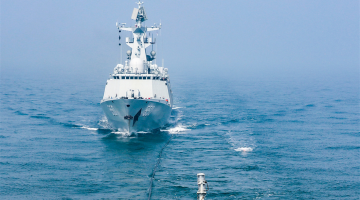By Zhang Yun
On May 3, North Korean leader Kim Jong-un told visiting Chinese State Councilor and Foreign Minister Wang Yi that achieving denuclearization of the peninsula was the firm position of North Korea. Some Western media portrayed Wang's recent visit as a reflection of China's fear of being sidelined in the recent whirlwind of diplomatic dynamics among North Korea, South Korea and the US. That theory was not only shallow analysis, but misleading about the understanding and indispensability of China's role in the fundamental peaceful resolution of the Korean Peninsula impasse.
First, in the short term China serves as an indispensable stability guarantor for possible unsuccessful US-North Korea summit. Despite the unprecedented political encouragement of US President Donald Trump in agreeing to a direct meeting with Kim, the unpredictability of US domestic dynamics and the president's unconventional leadership style remind us of the necessity of preparing for a worst-case scenario.
The contrasting treatment of nuclear proliferation by the US highlights the inconsistency of its foreign policy. On the one hand, the Trump-Kim summit raises expectations for a permanent peace on the peninsula.
On the other, Trump is expected to pull the US out of the Iran nuclear agreement on May 12, breaking the Joint Comprehensive Plan of Action signed by Iran with China, France, Germany, Russia, Britain and the US in 2015: the rare successful result of painstaking, concerted diplomatic efforts by major powers.
The possible departure of the US from the Iran deal is occurring in the context of the International Atomic Energy Agency recognizing Iran's compliance with the agreement. North Korea is doubtlessly watching unfolding developments and uncertainties on the Iran deal very carefully. Events may supply disincentives. That is why Wang Yi emphasized in his visit China's position in support of North Korea's rightful and reasonable security concerns.
Second, in the mid-term China will serve as an indispensable facilitator for a political and peaceful resolution of the peninsula issue. China was one of the three signatories to the 1953 Korean Armistice Agreement. Any exclusion of Chinese participation in the process of ending abnormalities on the Korean Peninsula would be unrealistic and impossible.
North Korea's final goal is the signing of a peace treaty and normalization of diplomatic relations with the US, perceived to be the key to removing its lingering external security threat. China shares this goal and has provided a pragmatic roadmap of simultaneous denuclearization and peace treaty negotiation. What North Korea is offering now is de facto echoing of the Chinese proposal.
Even if the US-North Korea summit goes well, the ensuing tough and detailed diplomatic negotiations might continue for years. In the process, uncertainties would not only come from the current popular suspicion in the West of North Korea's sincerity, but could also originate with US and South Korean domestic politics. Without consistent and firm Chinese support for a peace treaty, the momentum could fade when various distracting elements intrude into the process.
Third, in the long term China would serve as an indispensable companion in North Korea's smooth economic and social transition. The long-term stability of the peninsula fundamentally depends on the economic growth of North Korea. Due to decades of US economic sanctions, formal economic and political relations between the US and North Korea are negligible. For the US, the state of the North Korean economy is not the result of sanctions, but rather of gross mismanagement by decades of bad governance.
It is likely to be years before substantial changes in US economic sanctions on North Korea despite a successful Kim-Trump meeting. In this sense, China would naturally be the most important player to facilitate North Korea's economic transition and link it with the international community. It is the reason why Wang Yi expressed his firm support for North Korea focusing on economic construction.
The theory that China fears being marginalized is not well grounded. As a close neighbor to the peninsula, China has played and will continue to play a vital role. With balanced, skillful and sophisticated diplomacy toward North Korea, China will prove an indispensable player in the process of facilitating a sustained peace on the peninsula.
The author is associate professor, National Niigata University, Japan.









